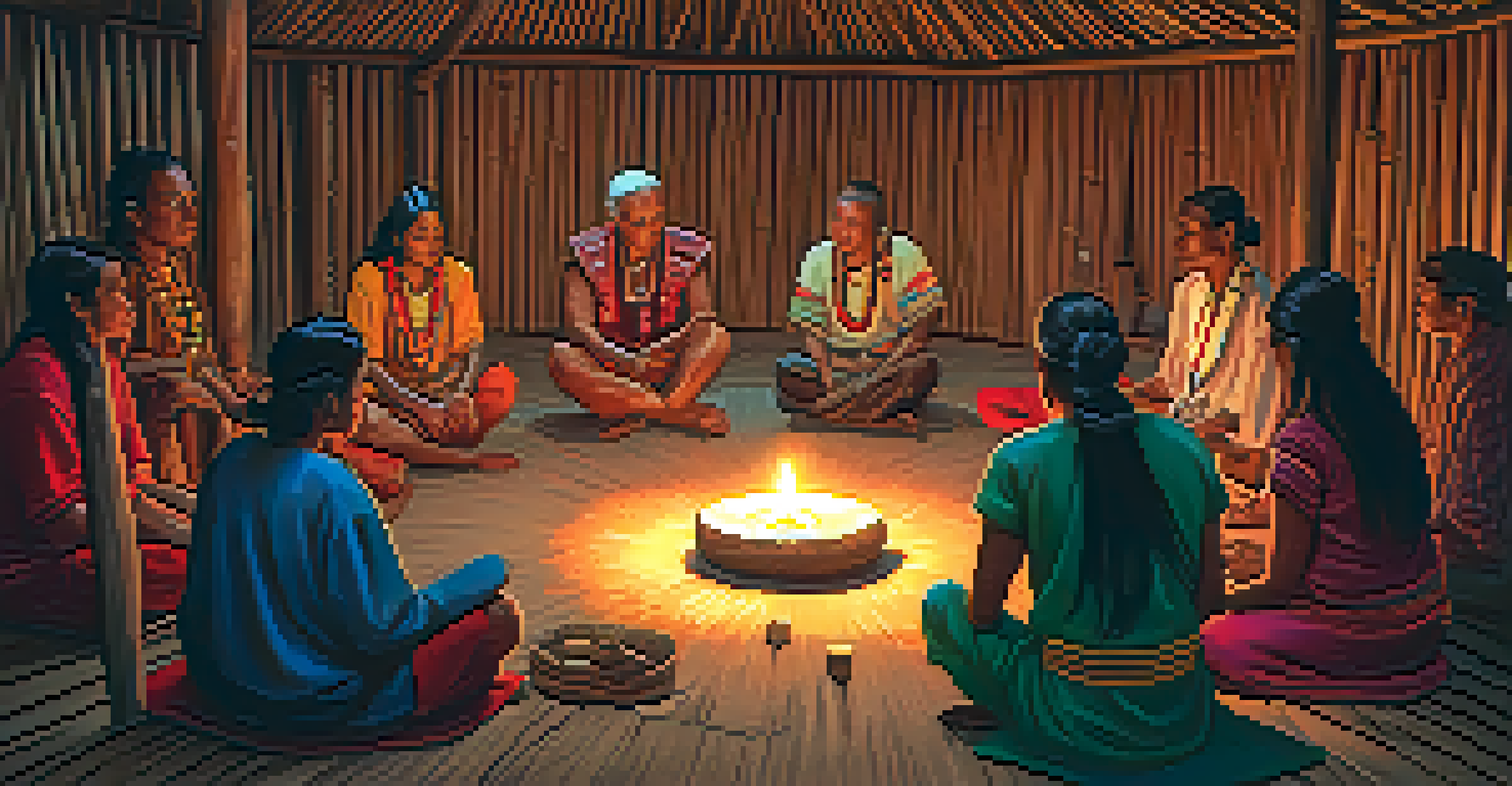Ethical Considerations in Commercial Ayahuasca Retreats

Understanding Ayahuasca and Its Cultural Roots
Ayahuasca is a powerful plant medicine traditionally used in Amazonian cultures for spiritual healing and connection. Understanding its cultural significance is crucial, as it helps us appreciate the depth of its use beyond mere recreational purposes. Many practitioners view ayahuasca as a sacred tool, integral to their identity and spirituality.
We must be careful not to confuse the essence of a culture with its commodification.
When commercial retreats promote ayahuasca experiences, they often navigate a fine line between honoring these traditions and profiting from them. This commercialization can lead to misunderstandings about the plant's use and potentially exploit indigenous cultures. Therefore, it’s essential for retreat centers to educate participants on the cultural context of ayahuasca.
A respectful approach involves acknowledging the origins of ayahuasca and incorporating traditional practices into modern retreats. This can foster a deeper appreciation among participants, ensuring they engage with the experience meaningfully and ethically.
The Issue of Cultural Appropriation
Cultural appropriation occurs when elements of one culture are adopted by another, often without permission or understanding. In the context of ayahuasca retreats, this can manifest when non-indigenous people profit from a sacred practice without respecting its origins. This raises ethical questions about who has the right to lead these ceremonies and benefit from them.

Commercial retreats sometimes overlook the voices of indigenous communities, who are the traditional stewards of ayahuasca. It’s vital to include these voices in discussions and decisions about retreat practices. By doing so, retreat organizers can help mitigate the risk of appropriation and foster genuine respect for the culture.
Respect Cultural Roots of Ayahuasca
Understanding and honoring the cultural significance of ayahuasca is essential to prevent exploitation and promote ethical practices in retreats.
Creating partnerships with indigenous healers can enrich the retreat experience while ensuring that cultural practices are honored. This collaborative approach not only benefits participants but also supports the communities from which these traditions originate.
Ensuring Informed Consent for Participants
Informed consent is a fundamental ethical principle that ensures participants understand what they are engaging in before partaking in an ayahuasca ceremony. This includes information about the potential risks, psychological impacts, and cultural significance of the experience. Clear communication is essential for participants to make educated choices.
True healing cannot be found in isolation; it must be rooted in respect and understanding of the traditions that came before us.
Some retreats may gloss over these details, leading to participants entering the experience unprepared. This can result in adverse reactions or misunderstandings about the ayahuasca journey. By providing thorough pre-ceremony education, organizers can promote a safer and more beneficial experience for everyone involved.
Moreover, creating an open dialogue about expectations and concerns can help participants feel more comfortable. This transparency fosters trust and respect, contributing to a more ethical retreat atmosphere.
Addressing Safety and Health Concerns
Safety is a paramount concern in any ayahuasca retreat, given the potent nature of the brew. Participants may have underlying health issues that could complicate their experience with ayahuasca, making it essential for retreat centers to conduct health screenings beforehand. This proactive approach can prevent potentially dangerous situations.
Moreover, trained facilitators should be present to manage any crises that arise during the ceremonies. This ensures participants have access to immediate support if they encounter challenging experiences, which can be common with ayahuasca. By prioritizing safety, retreats can create a more secure environment for exploration and healing.
Ensure Safety and Informed Consent
Retreat centers must prioritize informed consent and participant safety to foster a supportive and respectful environment.
Incorporating aftercare into the retreat program can further enhance participants' well-being. Providing access to counseling or integration support post-ceremony can assist individuals in processing their experiences more effectively.
The Role of Ethical Marketing in Retreats
Marketing plays a crucial role in how ayahuasca retreats are perceived and can easily misrepresent the experience. Ethical marketing involves portraying the ceremonies and their potential outcomes honestly, avoiding sensationalism that could mislead potential participants. Transparency about what to expect helps set realistic expectations.
Retreat centers should highlight the traditional aspects of ayahuasca use and the importance of cultural respect in their promotional materials. By doing so, they can attract individuals who are genuinely interested in the spiritual and healing aspects rather than those seeking a thrill.
Additionally, sharing testimonials from previous participants can provide insight into the retreat experience while maintaining ethical standards. These narratives can help potential attendees gauge whether a retreat aligns with their values and intentions.
Supporting Indigenous Communities Through Collaboration
One of the most significant ethical considerations is how commercial retreats can support the very communities that have cultivated these practices for generations. Collaborating with indigenous healers not only honors their traditions but can also provide them with much-needed financial support. This partnership can create a more equitable exchange between cultures.
By involving indigenous leaders in the planning and execution of retreats, organizers can ensure that practices are carried out respectfully and authentically. This collaboration can also educate participants about the importance of these communities and the challenges they face today.
Support Indigenous Communities
Collaborating with indigenous healers not only respects their traditions but also supports their communities financially and culturally.
Ultimately, fostering these relationships can lead to a more sustainable model for ayahuasca retreats that benefits both participants and the indigenous communities from which this wisdom originates.
The Importance of Ethical Practices in Integration
Integration refers to the process of incorporating insights gained from ayahuasca experiences into daily life. Ethical retreats should offer support for this crucial phase, helping participants navigate the often profound changes that arise after ceremonies. Providing resources for integration can enhance the long-term benefits of the experience.
Some retreats may overlook this aspect, leaving participants feeling lost or overwhelmed post-ceremony. By prioritizing integration, retreats demonstrate a commitment to the holistic well-being of their participants. This can involve workshops, discussions, or access to mental health professionals who specialize in integration.

Encouraging participants to reflect on their experiences helps them make sense of their journey and fosters personal growth. This ethical commitment can create a lasting impact, ensuring that the ayahuasca experience is not just a fleeting moment but a transformative journey.